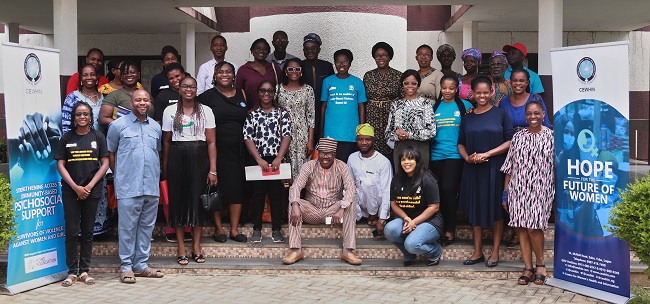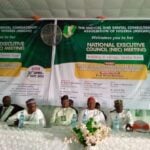The Centre for Women’s Health and Information (CEWHIN) has trained some community persons as community psychosocial first aiders in the management and prevention of gender-based violence (GBV) and advocated for more interventions and community-based psychosocial support for survivors of GBV, especially for girls and women including women and girls with disabilities, in South-western Nigeria.
The members and partners of the centre made this charge on Monday in Ibadan while holding a close-out/accountability meeting tagged: ‘Strengthening access to community-based psychosocial support for survivors of violence against women and girls.’
The meeting marked the end of the centre’s two-year project carried out in Ogun, Osun and Oyo states and supported by the Ford Foundation – with the purpose of working, supporting, and providing psychosocial interventions for gender-based survivors in the three states.
Delivering the opening remarks, the centre’s Programmes Officer, Pamela Stephens, noted that both the male and female genders experience gender and sexual violence, but statistics show that girls and women experience it more, hence their focus on the female gender.
Stephens, while appreciating their partners and contributors on the project, stated that the objective of the meeting was to give an account of the overall project and results achieved; to review lessons, gaps and challenges faced; and to get feedback from stakeholders and agree on next steps to take on the project.
According to her, this is not the end of the project but the beginning as partners and key stakeholders should continue and take the project principles and gains forward.
The overview of the project implementation, lessons learnt, challenges faced, and results achieved was presented by the Centre’s Director of Administration, Atinuke Odukoya.
Odukoya stated that the project’s ‘theory of change’ was based on prevention, awareness creation, and advocacy, together with a community-level capacity building of psychosocial first-aiders (PFAs) in the three states.
“Our aim, with the project, was to enhance a response system that provides improved psychosocial support and mitigation of violence against women and girls (VAWG) and sexual gender-based violence (SGBV)-linked mental health effects at the community level,” she said.
According to her, for the two years (2021 and 2022), the number of VAWGs survivors that accessed support from the community-trained PFAs in the three states were as follows: the first year, 2021/2022 (Osun, 91; Ogun, 103; Oyo, 71); the second year, 2022/2023 (Osun, 86; Ogun 109; Oyo, 53).
On the progress made so far, Odukoya said that a 12-person Project Working Group (PWG) was established for the project and that five PWG meetings were held (two physical and three virtual), with a baseline evaluation conducted.
She added that there was a capacity-building training for 17 trainers in Ogun, Oyo, and Osun; 248 community psychosocial first-aiders (CPFAs) trained, consisting of civil society organisation (CSOs)/community-based organisations (CBOs), school-based guidance counsellors and teachers, sexual assault and referral centre (SARC) members, community representatives, and religious leaders and institutions.
Odukoya lamented poverty as a key factor keeping women in abusive relationships, and that GBV still persists because of ignorance and cultural inhibitions, which calls for more efforts at awareness creation and sensitisation.
She stressed that religious institutions have a key role to play in matters of prevention and response to GBV and as such should rise to the task.
“Empowering women and girls and giving them skills will reduce their likelihood of being abused,” she added, “It is important to programme for persons with disabilities (PWDs) as there is a huge gap in awareness and service provision for PWDs.”
Some of the PWG members present at the event were: lawyer and Executive Director, Women Safe House Sustenance Initiative, Wuraoluwa Ayodele; lawyer and Executive Director, PLAN Health Advocacy and Development Foundation, Obatunde Oladapo; and consultant psychiatrist at the University College Hospital (UCH) Ibadan, and founder of Asido Foundation, Dr Jibril Abdulmalik.
Also in attendance was public health specialist, Dr Omowumi Okedare, who was involved in the project from start till date.
Some of the PFAs at the event narrated their experiences working with CEWHIN and with the victims/survivors of GBV in the three states. They all agreed that the task of ending GBV should not be the task of the government, CSOs, CBOs, NGOs, and security agencies alone, but the task of everybody. They also agreed that the advocacy and fight against GBV should be a continuous one.
Some of the important guests at the events, who made comments and contributions, included: the Programme Officer, Non-communicable Diseases, Oyo State Ministry of Health, Mrs T. O. Abioye; Head of Anti-Human Trafficking and Gender Unit, Nigerian Security and Defence Corps, Oyo State Chapter, Afe Olurotimi; Alaba Ehindero of the Centre for Support of Women in Unpaid and Informal Employment in Nigeria (WISEN), lawyer and founder of Savingcross Justicepoint Foundation, Oluwaseun Folajowon-Banjo; and Ojeloye Oginni.
Others included: Executive Director, Choice Solutions Welfare Initiative, Oluwakemi Ademole-Aramu; Executive Director, Frontida Zois Initiative, Petra Ogunfowokan; among others.
READ ALSO FROM NIGERIAN TRIBUNE






